| Listing 1 - 10 of 14 | << page >> |
Sort by
|
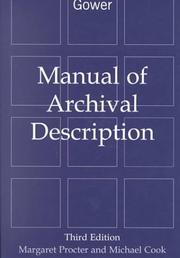
ISBN: 0566082586 Year: 2000 Publisher: Aldershot Gower
Abstract | Keywords | Export | Availability | Bookmark
 Loading...
Loading...Choose an application
- Reference Manager
- EndNote
- RefWorks (Direct export to RefWorks)
Archivistics --- Alphabetical cataloguing --- Cataloging of archival materials --- Catalogage --- Handbooks, manuals, etc --- Archives --- Guides, manuels, etc --- 930.25 --- AA / International- internationaal --- 655 --- 020 --- Cataloging of archival material --- -Cataloging of archival material --- -025.3414 --- Archival description (Cataloging) --- Cataloging of archives --- Archival materials --- Archiefwetenschap. Archivistiek --- Archieven en dossiers. --- Bibliotheekwezen: algemeenheden. --- 930.25 Archiefwetenschap. Archivistiek --- 025.3414 --- Bibliotheekwezen: algemeenheden --- Archieven en dossiers
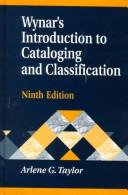
ISBN: 1563084945 1563088576 Year: 2000 Publisher: Littleton Libraries unlimited
Abstract | Keywords | Export | Availability | Bookmark
 Loading...
Loading...Choose an application
- Reference Manager
- EndNote
- RefWorks (Direct export to RefWorks)
Cataloging --- Classification --- Catalogage --- Handbooks, manuals, etc. --- Books --- Guides, manuels, etc --- Livres --- Anglo-American cataloguing rules --- 025.3 --- 025.4 --- -Knowledge, Classification of --- Information organization --- Cataloguing --- Technical services (Libraries) --- Catalogustechniek. Catalogiseren --- Ontsluitings- en terugzoektalen. Classificaties. Thesauri. Metadata voor information retrieval --- -Catalogustechniek. Catalogiseren --- 025.4 Ontsluitings- en terugzoektalen. Classificaties. Thesauri. Metadata voor information retrieval --- 025.3 Catalogustechniek. Catalogiseren --- -Cataloguing --- Knowledge, Classification of --- Classification of books --- Libraries --- Library classification of books --- Subject cataloging --- Anglo-American cataloguing rules. --- AACR 2 --- Anglo-American cataloging rules --- AACR2
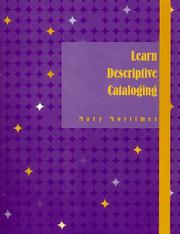
ISBN: 0810836939 Year: 2000 Volume: 3 Publisher: Lanham, Md. : Scarecrow Press,
Abstract | Keywords | Export | Availability | Bookmark
 Loading...
Loading...Choose an application
- Reference Manager
- EndNote
- RefWorks (Direct export to RefWorks)
Descriptive cataloging --- MARC formats --- Catalogage --- MARC --- Rules --- Handbooks, manuals, etc --- Hanbooks, manuals, etc --- Règles --- Guides, manuels, etc --- Formats --- Guides, manuels, etc --- Anglo-American cataloguing rules.
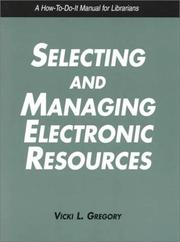
ISBN: 1555703828 Year: 2000 Volume: 101 Publisher: New York : Neal-Schuman Publishers,
Abstract | Keywords | Export | Availability | Bookmark
 Loading...
Loading...Choose an application
- Reference Manager
- EndNote
- RefWorks (Direct export to RefWorks)
Information systems --- Documentation and information --- Libraries --- Database selection --- Cataloging of computer files --- Cataloging of databases --- Bibliothèques --- Bases de données --- Catalogage --- Special collections --- Electronic information resources --- Databases --- Fonds spéciaux --- Sources d'information électroniques --- Choix --- Fichiers (Informatique) --- Bibliothèques --- Bases de données --- Fonds spéciaux --- Sources d'information électroniques
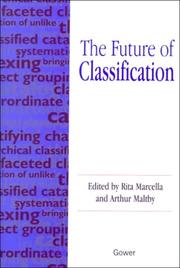
ISBN: 0566079925 9780566079924 Year: 2000 Publisher: Hampshire Vermont Gower
Abstract | Keywords | Export | Availability | Bookmark
 Loading...
Loading...Choose an application
- Reference Manager
- EndNote
- RefWorks (Direct export to RefWorks)
025.4.05 --- 025.4.05 Universele classificaties. Universele thesauri --- Universele classificaties. Universele thesauri --- Classification --- Classification of books --- Libraries --- Library classification of books --- Subject cataloging --- Books --- Subject indexing --- Books. --- Livres --- Classification - Books
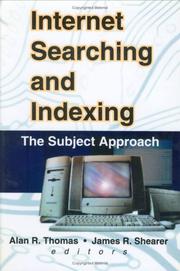
ISBN: 0789010313 0789010305 Year: 2000 Publisher: New York Haworth
Abstract | Keywords | Export | Availability | Bookmark
 Loading...
Loading...Choose an application
- Reference Manager
- EndNote
- RefWorks (Direct export to RefWorks)
Computer architecture. Operating systems --- Cataloging of computer network resources --- Internet searching --- Internet searching. --- Catalogage --- Recherche sur Internet --- Information électronique --- #A0107A --- 691 Internet --- Méthodes de recherche Onderzoekstechnieken --- Information (gestion) Informatie (management) --- Internet Internet --- Informatique Informatica --- Communication (langue anglaise) Communicatie (Engelse taal) --- Catalogues Catalogi --- Web Web --- -Internet searching --- -Cataloging of computer network resources --- 025.04 --- Searching the Internet --- Web searching --- World Wide Web searching --- Electronic information resource searching --- Computer network resources --- Information électronique
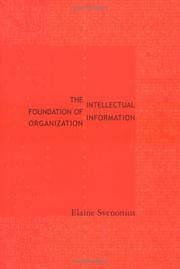
ISBN: 0262194333 9780262284615 0262284618 0585275947 9780585275949 Year: 2000 Publisher: Cambridge, Mass. : MIT Press,
Abstract | Keywords | Export | Availability | Bookmark
 Loading...
Loading...Choose an application
- Reference Manager
- EndNote
- RefWorks (Direct export to RefWorks)
Integrating the disparate disciplines of descriptive cataloging, subject cataloging, indexing, and classification, the book adopts a conceptual framework that views the process of organizing information as the use of a special language of description called a bibliographic language.Instant electronic access to digital information is the single most distinguishing attribute of the information age. The elaborate retrieval mechanisms that support such access are a product of technology. But technology is not enough. The effectiveness of a system for accessing information is a direct function of the intelligence put into organizing it. Just as the practical field of engineering has theoretical physics as its underlying base, the design of systems for organizing information rests on an intellectual foundation. The subject of this book is the systematized body of knowledge that constitutes this foundation.Integrating the disparate disciplines of descriptive cataloging, subject cataloging, indexing, and classification, the book adopts a conceptual framework that views the process of organizing information as the use of a special language of description called a bibliographic language. The book is divided into two parts. The first part is an analytic discussion of the intellectual foundation of information organization. The second part moves from generalities to particulars, presenting an overview of three bibliographic languages: work languages, document languages, and subject languages. It looks at these languages in terms of their vocabulary, semantics, and syntax. The book is written in an exceptionally clear style, at a level that makes it understandable to those outside the discipline of library and information science.
025.4 --- 002 --- 002 Informatieverzorging i. v. m. documentatie --- Informatieverzorging i. v. m. documentatie --- 025.4 Ontsluitings- en terugzoektalen. Classificaties. Thesauri. Metadata voor information retrieval --- Ontsluitings- en terugzoektalen. Classificaties. Thesauri. Metadata voor information retrieval --- Bibliography --- Cataloging --- Information organization --- Bibliographic control --- Bibliographical control --- Library research --- Information storage and retrieval --- Organization of information --- Information science --- Information storage and retrieval systems --- Cataloguing --- Technical services (Libraries) --- Books --- Methodology --- Theory, methods, etc. --- Computer architecture. Operating systems --- Documentation and information --- Information organization. --- Cataloging. --- Organisation de l'information --- Bibliographie --- Catalogage --- Methodology. --- Méthodologie --- INFORMATION SCIENCE/General --- INFORMATION SCIENCE/Library Science --- Information, gestion de l' --- Methodologie
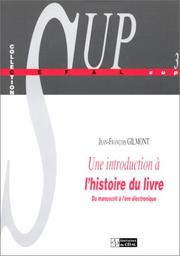
ISBN: 2871300860 9782871300861 Year: 2000 Volume: 3 Publisher: Liège Editions du Céfal
Abstract | Keywords | Export | Availability | Bookmark
 Loading...
Loading...Choose an application
- Reference Manager
- EndNote
- RefWorks (Direct export to RefWorks)
Geschiedenis van het boek --- Histoire du livre --- Books --- Printing --- Livres --- Imprimerie --- History --- Histoire --- 091 --- 655.11 --- 655.28.022 --- -Library materials --- Publications --- Bibliography --- Cataloging --- International Standard Book Numbers --- Handschriftenkunde. Handschriftencatalogi --- Boekdrukkunst: ontstaan--algemeen --- Arbeidsfasen bij drukvoorbereiding. Pre-press. Kopijvoorbereiding. Copy-editing --- -Handschriftenkunde. Handschriftencatalogi --- 091 Handschriftenkunde. Handschriftencatalogi --- -091 Handschriftenkunde. Handschriftencatalogi --- Library materials --- Books - History
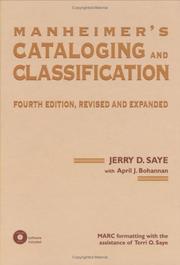
ISBN: 0824794761 Year: 2000 Publisher: New York (N.Y.) Dekker
Abstract | Keywords | Export | Availability | Bookmark
 Loading...
Loading...Choose an application
- Reference Manager
- EndNote
- RefWorks (Direct export to RefWorks)
025.3 --- 025.4 --- 025.3 Catalogustechniek. Catalogiseren --- Catalogustechniek. Catalogiseren --- 025.4 Ontsluitings- en terugzoektalen. Classificaties. Thesauri. Metadata voor information retrieval --- Ontsluitings- en terugzoektalen. Classificaties. Thesauri. Metadata voor information retrieval --- Cataloging --- Classification --- Knowledge, Classification of --- Information organization --- Cataloguing --- Technical services (Libraries) --- Books --- Catalogage --- Livres --- Problemes et exercices --- Etats-unis --- Problemes et excercices
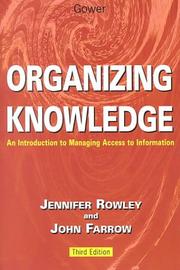
ISBN: 0566080478 9780566080470 Year: 2000 Publisher: Aldershot Gower
Abstract | Keywords | Export | Availability | Bookmark
 Loading...
Loading...Choose an application
- Reference Manager
- EndNote
- RefWorks (Direct export to RefWorks)
Information organization --- Cataloging --- Données bibliographiques lisibles par machine --- Indexation --- Indexeren --- Machine-leesbare bibliografische gegevens --- Machine-readable bibliographic data --- Machine readable bibliographic data --- Indexation (Documentation) --- Gestion de données Gegevensmanager --- -025.524 --- Cataloguing --- Organization of information --- 025.524 --- Centres de documentation Documentatiecentra --- Gestion des connaissances Kennisbeheer --- Information (gestion) Informatie (management) --- Internet Internet --- Systèmes informatiques Geïnformatiseerde systemen --- 025.3 --- 025.4 --- 025.3 Catalogustechniek. Catalogiseren --- Catalogustechniek. Catalogiseren --- Technical services (Libraries) --- Books --- Information storage and retrieval --- Information science --- Information storage and retrieval systems --- 025.4 Ontsluitings- en terugzoektalen. Classificaties. Thesauri. Metadata voor information retrieval --- Ontsluitings- en terugzoektalen. Classificaties. Thesauri. Metadata voor information retrieval --- Information retrieval --- Classification --- Indexing --- Knowledge, Theory of --- Recherche de l'information --- Catalogage --- Théorie de la connaissance --- Data processing --- Informatique --- Knowledge [Theory of ] --- Information organization - English-speaking countries --- Cataloging - English-speaking countries
| Listing 1 - 10 of 14 | << page >> |
Sort by
|

 Search
Search Feedback
Feedback About
About Help
Help News
News